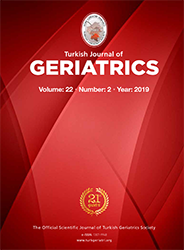Materials and Method: We planned the study as prospective, randomized and double blinded. The study group was consisted of American Society of Anesthesiologist score I- II over 65 years old 46 preoperative non- cardiac surgery patients which randomly separated into the general or selective spinal anesthesia groups. Demographic characteristics of the groups were nearly the same. Anesthesia was performed via injection of bupivacaine 5 mg in Lumbar 4-5 intervertebral space in selective spinal anesthesia group, and propofol and remifentanil for anesthesia induction and then desflurane inhalation with laryngeal mask for anesthesia maintenance in general anesthesia group. Patients" 12 lead electrocardiograms and high sensitive- troponins were taken on the day of operation and postoperative day 1, 2 and 3.
Results: In this study any cardiac complication was observed and high sensitive- Troponin T levels were at the normal range of mean of 13.90±4, 24 ng/ (95% CI, 8.90-18.20; p=0.43). High sensitive-Troponin T was slightly increased the near significant of a mean19.34± 3.2 ng/L(95% CI, 15.43- 23.52; p= 0.05) in spinal anesthesia group than general anesthesia on postoperative third day.
Conclusion: Any distinct difference in myocardial injury was not observed between low risk non cardiac operations in the elderly with selective spinal anesthesia and with general anesthesia methods in our study. However, the third day increase in high sensitive-Troponin in selective spinal anesthesia group needs larger studies with longer follow- up in moderate to high risk patients in clinical practice usage.
Keywords : Aged; Anesthesia; Surgical Procedures, Operative; Postoperative complications; Troponin
